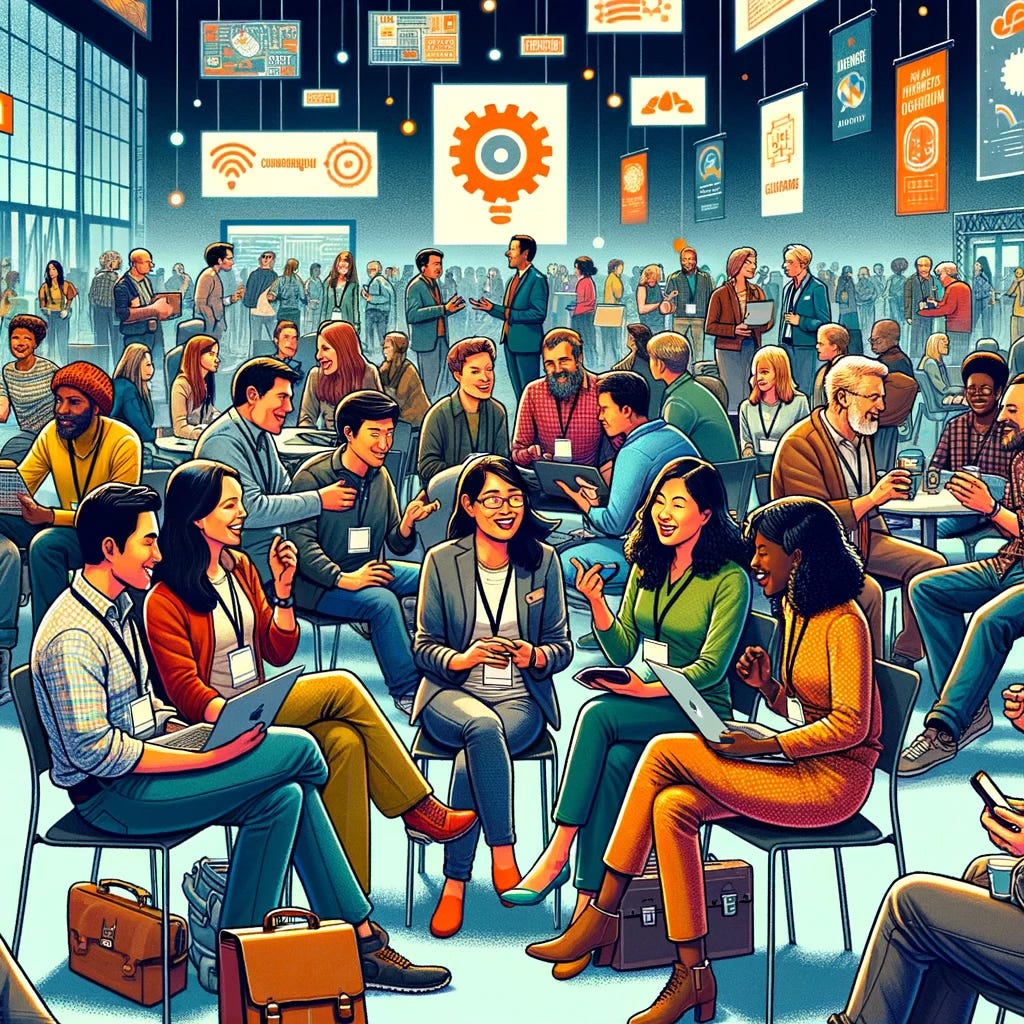Networking, collaboration and friendship
There's more to life than linking-in
I was recently at an evening reception during a tech conference. A young woman in product marketing who I have known for a few years asked me: Who do I need to talk to here? The obvious answer would have been: Me, because I’m bored. But instead I pointed out a couple of people, including someone at a similar company to her own.
What’s the angle? Is he a hire? Hiring? Well-connected?
Actually he’s a really interesting guy. Iranian background, brought up in Tanzania, university in Sweden. He really knows the technology, but you get the feeling he would absorb any technicalities at any company. I think he’s remarkable.
So maybe some market insight?
Yes maybe, but he’s just really interesting. I enjoyed talking to him.
I’m not sure what I’ll get out of it.
A good conversation? A friend?
You’re a terrible matchmaker Donald! I’m here for connections.
I’m not going to make too much of my young friend’s approach in itself – we laughed about it. Who can blame her, with one hour to mingle in a tough technology market? Most others at the event seemed to have a similar focus. Networking in our industry feels so very transactional.
Transactional or transformational
Professional communities do tend to form around specific skills, technologies, or companies, but this can lead to a culture of exclusivity and hierarchy. Networking events and social media platforms often become arenas where professional status and connections are blatantly traded. The pursuit of staying ahead stimulates a competitive environment where individuals focus on personal advancement or aligning with preferred thought leaders rather than seeing themselves as members of a creative community of practice.
It’s not always so, of course. There are deep friendships forged in the tech industry but mostly when people work together at the same company - and the friendship abides when we move on. Rarely do you see friendships formed across organizational boundaries in the tech community as a whole. You’ll often hear tech people saying that competition is a creative force, but rarely collaboration.
I find this rather dispiriting compared to the communities which emerge in the craft movement and the arts. It is not as if those fields are not competitive in the purely financial sense: there are relatively few buyers, often with limited budgets and artists and crafters have to make a living. And yet the drive is to mutually encourage each other, to learn from each other, to share.
Importantly, in the arts, creative expression and skill are often seen as ends in themselves, rather than merely as means to commercial success – or more often just commercial survival. While making a living is important and difficult, the internal rewards of perfecting one's craft and contributing to the broader culture are often foremost. There is a shared understanding that craft enriched by shared ideas benefits the entire individual and the community. Perhaps this comes from recognizing that artistic vision can never be fully quantified or ranked. In tech, we often focus narrowly on optimization, scalability and metrics. But the human need to create, to explore ideas and to contribute transcends measure.
Looking back to the transactional networking at my reception I do have to wonder how we can better in our business? How can we look beyond immediate professional gains? While it's natural to seek beneficial connections, there's immense value in interactions that don't have a clear, immediate payoff. Friendships with complex, diverse people can be unexpectedly enriching. Unexpected being the important term because you never know when or how you will appreciate them most.
I am going to write more about communities of practice very soon. It’s an important concept in my understanding of how work can be better both economic and emotionally. Meanwhile, if you are attending a tech event, look for the people you normally would not connect with. Who are they? What can you learn from them? What can you share? Make some friends, not just a number of new connections.



I am reading this while sitting in a coffee shop, and there’s quite a bit of staring now because I am laughing out loud. So true.
Reminds me of what I saw this morning while walking on the beach. A pod of dolphins was working together to turn a shoal of baitfish into a buffet, and dozens of gulls and pelicans were randomly bombing in to pick up the bits and pieces left behind.
In my experience, the communities of practice you mention do exist, but they’re relatively small pods of highly evolved individuals who have the curiosity, flexibility, patience, skills, and confidence to work as if the solution to any meaningful problem requires decades of clever collaboration with many diverse contributors across arbitrary organization boundaries. Which it does.
In the short run, the birds seem to have found a relatively easy strategy. But, their strategy is actually derivative of and dependent upon the richer collaborative work of others…who are interested in more than scraps.
Donald, you're dead on. The reason I'm in this industry is because, not in spite of, collaboration. It's the community, and as you state, we're all the better when we reconnect with our friends across the industry and share insights and questions in spontaneous, random conversations. Two (or more) heads are better than one.